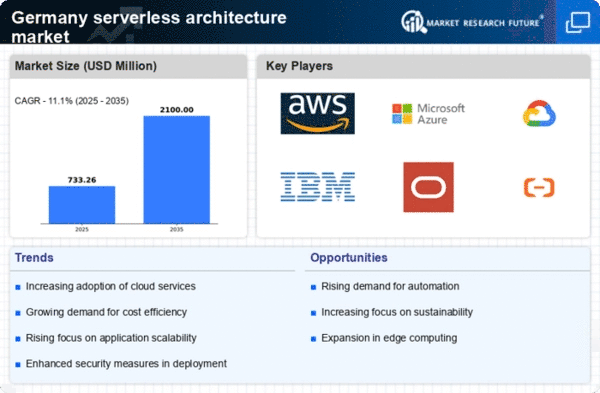Emergence of Edge Computing
The rise of edge computing is emerging as a pivotal driver for the serverless architecture market in Germany. As organizations seek to process data closer to the source, the integration of serverless architectures with edge computing is becoming increasingly relevant. This trend is particularly significant in industries such as manufacturing and automotive, where real-time data processing is crucial. Research indicates that around 40% of German companies are exploring edge computing solutions, which could enhance the performance of serverless applications. The convergence of these technologies is likely to create new opportunities within the serverless architecture market, as businesses aim to leverage the benefits of both edge computing and serverless solutions.
Growing Demand for Scalability
the serverless architecture market in Germany is seeing a significant increase in demand for scalable solutions.. As businesses increasingly seek to enhance their operational efficiency, the ability to scale applications seamlessly becomes paramount. This trend is particularly evident in sectors such as e-commerce and finance, where fluctuating workloads necessitate flexible infrastructure. According to recent data, approximately 60% of German enterprises are prioritizing scalability in their IT strategies. This growing emphasis on scalability is driving investments in serverless technologies, as organizations aim to optimize resource allocation and reduce latency. Consequently, the serverless architecture market is expected to grow as companies adopt these solutions to meet their changing needs..
Shift Towards Microservices Architecture
The transition to microservices architecture is significantly influencing the serverless architecture market in Germany. Organizations are increasingly recognizing the advantages of breaking down monolithic applications into smaller, manageable services. This shift allows for enhanced agility, faster deployment, and improved fault isolation. In fact, studies indicate that around 55% of German companies are adopting microservices as part of their digital transformation initiatives. As microservices gain traction, the demand for serverless solutions that facilitate this architecture is expected to rise. The serverless architecture market is thus poised for growth, as businesses leverage these technologies to streamline their development processes and enhance overall system performance.
Increased Focus on Developer Productivity
In Germany, the serverless architecture market is being propelled by a heightened focus on developer productivity. Organizations are increasingly aware that efficient development processes can lead to faster time-to-market and improved innovation. Serverless architectures enable developers to concentrate on writing code without the burden of managing infrastructure, which can enhance productivity by up to 30%. This shift is particularly relevant in the tech sector, where rapid development cycles are essential. As companies strive to optimize their development workflows, the serverless architecture market is likely to benefit from this trend, as more organizations adopt serverless solutions to empower their development teams.
Regulatory Compliance and Data Sovereignty
The serverless architecture market in Germany is also influenced by the need for regulatory compliance and data sovereignty. With stringent data protection laws such as the General Data Protection Regulation (GDPR), organizations are compelled to ensure that their data handling practices align with legal requirements. This has led to an increased demand for serverless solutions that can provide secure and compliant environments for data processing. Approximately 70% of German enterprises are prioritizing compliance in their cloud strategies, which is likely to drive growth in the serverless architecture market. As businesses seek to navigate the complexities of regulatory frameworks, the adoption of compliant serverless solutions is expected to rise.
















